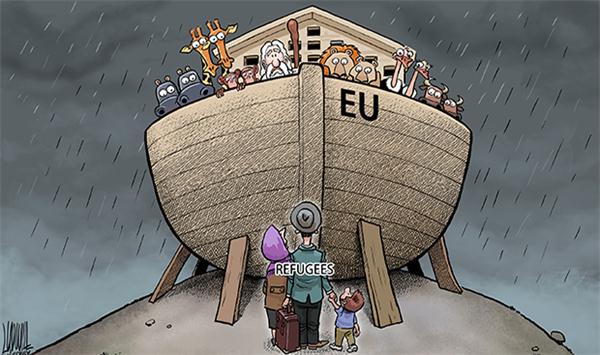What can China learn from illegal immigration in Europe?
Updated: 2015-08-28 15:33
(chinadaily.com.cn)
|
|||||||||||

The recent wave of illegal immigrants looking to enter European countries has captured international attention.
Unlike previous illegal immigrants who sought a better quality of life and social policies, this crisis is mostly about refugees that escape from conflicts and instability in Africa and the Middle East, which have caught the European countries in a dilemma between preserving humanitarian principles and dealing with a potential surge in asylum claims and illegal entry.
Now the surge of migration has overwhelmed authorities in Europe, but they can’t send these people back to the places where their life and safety are threatened.
In fact, the issue of refugees will possibly pose great challenges to the stability in Europe in the following decades, and even worse, may bring about larger-scale social turbulence.
A similar crisis may befall China one day, because on the one hand, China has more job opportunities and better welfare compared with many countries, and on the other hand, the social and political instability in many areas including China’s neighboring countries may produce a flow of refugees who want to cross the borders into China.
Although the current refugee issues mainly come from China’s southwestern and northeastern areas, the potential issue in northwestern areas cannot be ignored because the improvement of the infrastructure in Central Asia have created easier access to this area. Chinese authorities should prepare in advance in the following three ways.
Firstly, in order to avoid humanitarian disasters, China should help the neighboring countries to create a stable and prosperous living environment under the basic principle of non-intervention of internal affairs. The increasing flow of illegal migrants in Europe largely come from Syria and Libya where the original authorities were overturned by the US and European states. For some backward countries, the reckless political reform may cause social upheaval.
Further, Chinese authorities should take measures to enable refugees and asylum seekers to be better integrated into Chinese society and deepen their understanding of Chinese culture.
Finally, China should see the refugee issue objectively. Although refugees may be a “burden” on the Chinese government, they can also contribute to the richness in diversity of Chinese culture. More importantly, if China wants a bigger say in international affairs, it is necessary to handle the issue of refugees well.
Related Stories
US illegal immigrant removals fall in fiscal 2013 2013-12-20 09:33
Canada immigrant investor program sputters 2015-07-30 12:13
Immigrant goes from dishwasher to Michelin-starred chef 2015-04-09 08:24
Immigrant dressmakers bring touch of Afghanistan 2015-02-17 07:48
Today's Top News
Why China will experience a 'soft' landing
Property investment rules eased
Ministry denies troops sent to reinforce DPRK border
Apple may launch new iPhones at Sept 9 event
Hungary scrambles to confront migrant influx
11 under investigation and 12 detained over Tianjin explosions
Up to 50 refugees found dead
in lorry in Austria
Net migration to UK hits record high
Hot Topics
Lunar probe , China growth forecasts, Emission rules get tougher, China seen through 'colored lens', International board,
Editor's Picks

|

|

|

|

|

|






